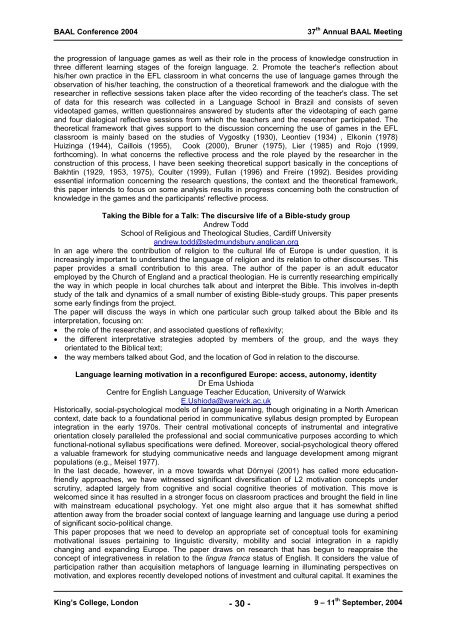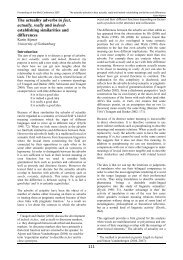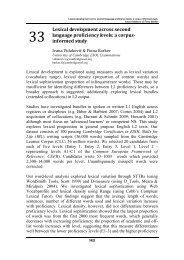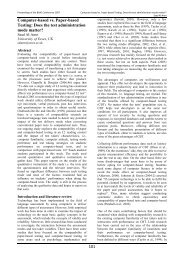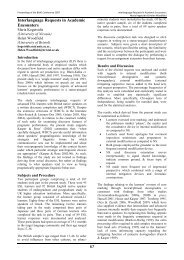Colloquia - British Association for Applied Linguistics
Colloquia - British Association for Applied Linguistics
Colloquia - British Association for Applied Linguistics
You also want an ePaper? Increase the reach of your titles
YUMPU automatically turns print PDFs into web optimized ePapers that Google loves.
BAAL Conference 2004 37 th Annual BAAL Meeting<br />
the progression of language games as well as their role in the process of knowledge construction in<br />
three different learning stages of the <strong>for</strong>eign language. 2. Promote the teacher's reflection about<br />
his/her own practice in the EFL classroom in what concerns the use of language games through the<br />
observation of his/her teaching, the construction of a theoretical framework and the dialogue with the<br />
researcher in reflective sessions taken place after the video recording of the teacher's class. The set<br />
of data <strong>for</strong> this research was collected in a Language School in Brazil and consists of seven<br />
videotaped games, written questionnaires answered by students after the videotaping of each game<br />
and four dialogical reflective sessions from which the teachers and the researcher participated. The<br />
theoretical framework that gives support to the discussion concerning the use of games in the EFL<br />
classroom is mainly based on the studies of Vygostky (1930), Leontiev (1934) , Elkonin (1978)<br />
Huizinga (1944), Caillois (1955), Cook (2000), Bruner (1975), Lier (1985) and Rojo (1999,<br />
<strong>for</strong>thcoming). In what concerns the reflective process and the role played by the researcher in the<br />
construction of this process, I have been seeking theoretical support basically in the conceptions of<br />
Bakhtin (1929, 1953, 1975), Coulter (1999), Fullan (1996) and Freire (1992). Besides providing<br />
essential in<strong>for</strong>mation concerning the research questions, the context and the theoretical framework,<br />
this paper intends to focus on some analysis results in progress concerning both the construction of<br />
knowledge in the games and the participants' reflective process.<br />
Taking the Bible <strong>for</strong> a Talk: The discursive life of a Bible-study group<br />
Andrew Todd<br />
School of Religious and Theological Studies, Cardiff University<br />
andrew.todd@stedmundsbury.anglican.org<br />
In an age where the contribution of religion to the cultural life of Europe is under question, it is<br />
increasingly important to understand the language of religion and its relation to other discourses. This<br />
paper provides a small contribution to this area. The author of the paper is an adult educator<br />
employed by the Church of England and a practical theologian. He is currently researching empirically<br />
the way in which people in local churches talk about and interpret the Bible. This involves in-depth<br />
study of the talk and dynamics of a small number of existing Bible-study groups. This paper presents<br />
some early findings from the project.<br />
The paper will discuss the ways in which one particular such group talked about the Bible and its<br />
interpretation, focusing on:<br />
� the role of the researcher, and associated questions of reflexivity;<br />
� the different interpretative strategies adopted by members of the group, and the ways they<br />
orientated to the Biblical text;<br />
� the way members talked about God, and the location of God in relation to the discourse.<br />
Language learning motivation in a reconfigured Europe: access, autonomy, identity<br />
Dr Ema Ushioda<br />
Centre <strong>for</strong> English Language Teacher Education, University of Warwick<br />
E.Ushioda@warwick.ac.uk<br />
Historically, social-psychological models of language learning, though originating in a North American<br />
context, date back to a foundational period in communicative syllabus design prompted by European<br />
integration in the early 1970s. Their central motivational concepts of instrumental and integrative<br />
orientation closely paralleled the professional and social communicative purposes according to which<br />
functional-notional syllabus specifications were defined. Moreover, social-psychological theory offered<br />
a valuable framework <strong>for</strong> studying communicative needs and language development among migrant<br />
populations (e.g., Meisel 1977).<br />
In the last decade, however, in a move towards what Dörnyei (2001) has called more educationfriendly<br />
approaches, we have witnessed significant diversification of L2 motivation concepts under<br />
scrutiny, adapted largely from cognitive and social cognitive theories of motivation. This move is<br />
welcomed since it has resulted in a stronger focus on classroom practices and brought the field in line<br />
with mainstream educational psychology. Yet one might also argue that it has somewhat shifted<br />
attention away from the broader social context of language learning and language use during a period<br />
of significant socio-political change.<br />
This paper proposes that we need to develop an appropriate set of conceptual tools <strong>for</strong> examining<br />
motivational issues pertaining to linguistic diversity, mobility and social integration in a rapidly<br />
changing and expanding Europe. The paper draws on research that has begun to reappraise the<br />
concept of integrativeness in relation to the lingua franca status of English. It considers the value of<br />
participation rather than acquisition metaphors of language learning in illuminating perspectives on<br />
motivation, and explores recently developed notions of investment and cultural capital. It examines the<br />
King‟s College, London 9 – 11 th - 30 -<br />
September, 2004


